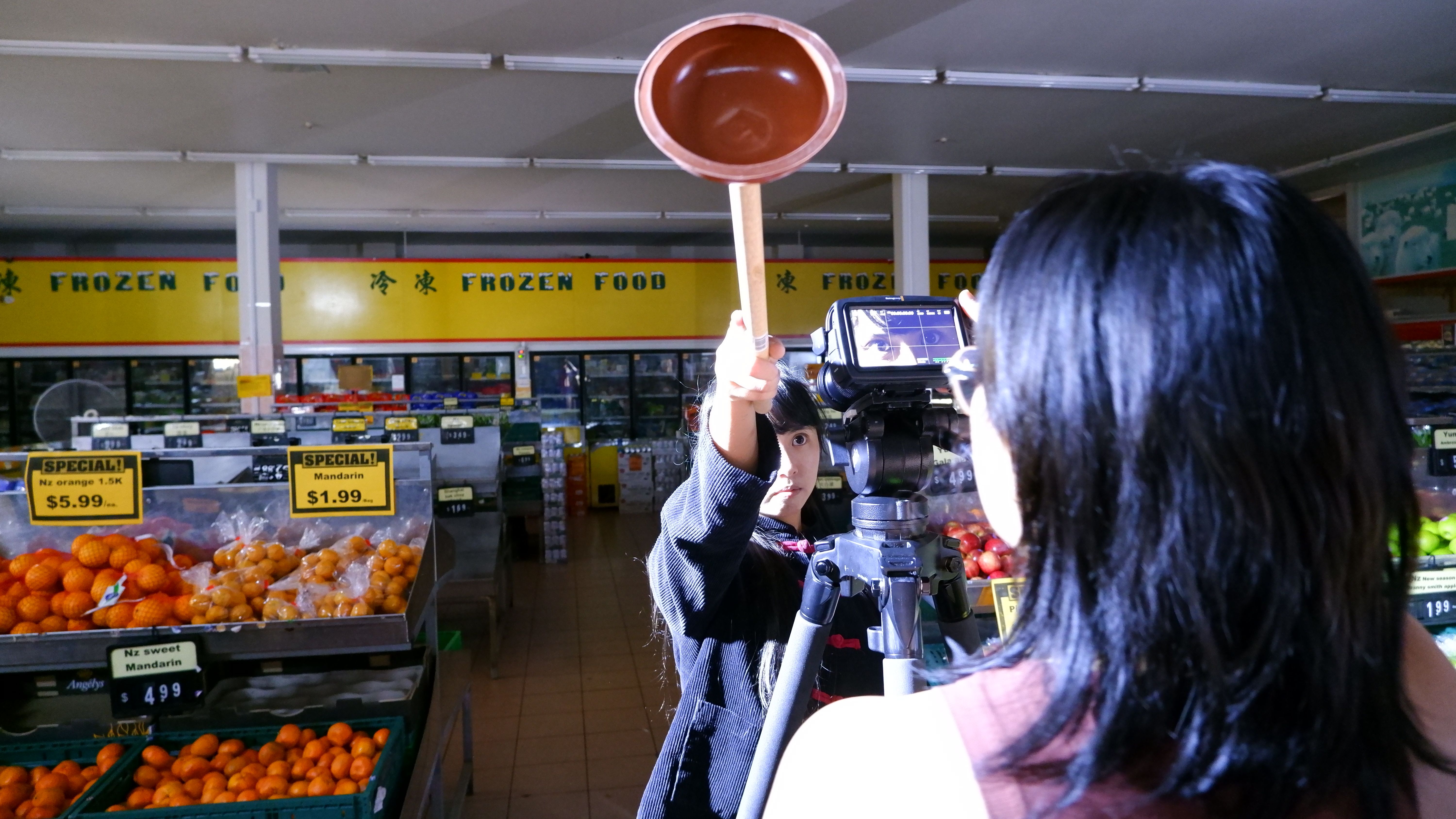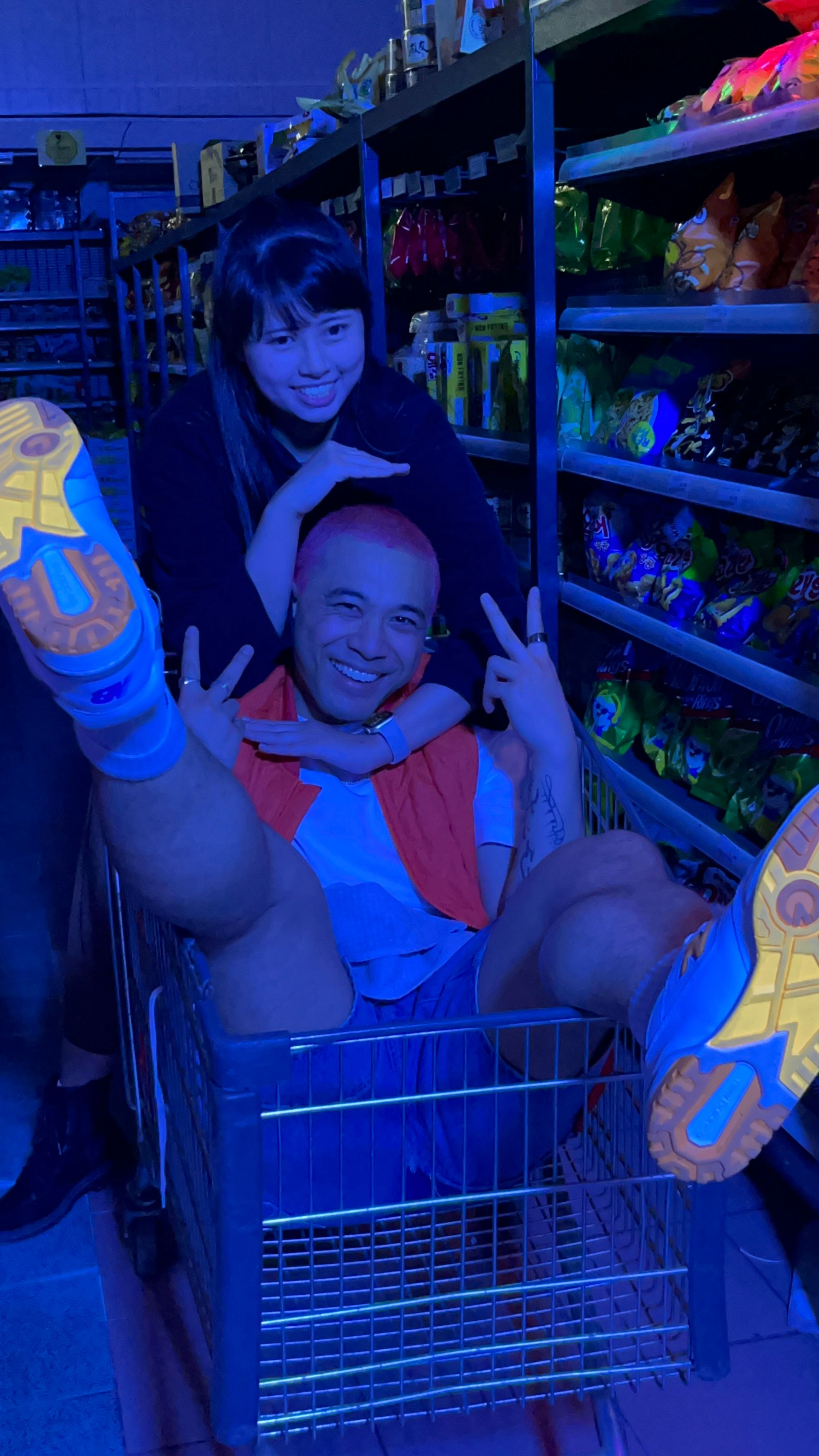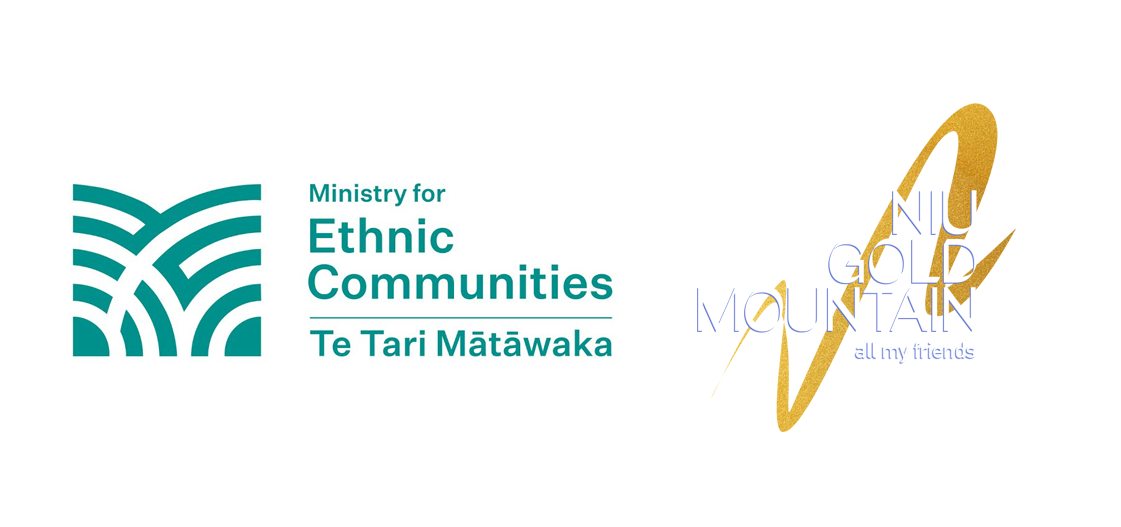“What is Your New Gum San?” Your Gold Mountain
In partnership with All My Friends, we have invited four writers to reflect on the themes, locations and stories explored in the video series Niu Gold Mountain. First off, Ruby Macomber responds to the music video Movin’, by Gwen Lin, Tyrun Posimani and Yin-Chi Lee, set in Lim Chhour Foodcourt.
All My Friends are a creative collective from Tāmaki Makaurau who dream up and create events for our Queer and PoC whānau. Niu Gold Mountain is a four-part collaborative video project with 13 emerging Asian and Pasifika creatives, which asks “What is your New Gold Mountain?” The search for a better life is a story that commonly defines the migrant diaspora in Aotearoa.
In partnership with All My Friends, we have invited four writers to reflect on the themes, journeys and stories explored in these videos. In this first essay, Ruby Macomber responds to the music video Movin’, by Gwen Lin, Tyrun Posimani and Yin-Chi Lee.
Read the whole series here, and find out more about All My Friends here.
Pālagi thirty-somethings close off their Friday night with Rihanna’s ‘Diamonds’. I am not a city gorl, nor did I inherit wayfinding beyond a Google Maps dependency. But I know to keep moving; it is so easy to fall through colonial cracks.
The buildings of Karangahape Road are relatively unchanged from the late 1940s, but gentrification scowls the roll of our Rs, the iri waves and the fluency with which life is spoken here. Scorpio Bar is yet to wake, but Lim Chhour waits with the lights on. We walk second-hand stories now.
In Movin’, creatives Tyrun Posimani and Yin-Chi Lee work together to track down the elusive ‘Niu Gold Mountain’ drink in Karangahape Road’s Lim Chhour supermarket. According to singer and songwriter Tyrun, the video captures the space that joy and connection have in Pacific and Asian diasporic reclamation journeys. While so often Pacific and Asian communities are positioned against each other, Movin’ celebrates a relationship that can, and does, exist. “We are creating communities for you to celebrate; we do not want it to happen in isolation,” Tyrun adds.
Fluency is a trust in the tongue to navigate story and self. To call out romanticised mountains and the idea that honey cannot help but run into trouble. Like waves to the tongue, milk and honey are not exclusive to financial prosperity but speak to magnitude and migration. The wholeness of our being, our joy, and a journey towards the collective and community reimagining what it means to be diasporic.
Gwen Lin. Behind the scenes of Movin'. Photo courtesy of All My Friends.
Tyrun’s desire to make music was fuelled by what he was seeing, and what he was not seeing: “All My Friends started in a similar way, we weren’t seeing things that represented us.” Tyrun is also a co-director of the collective, with Tommy Jiang, Mariadelle (Abbey) Gamit and Kevin Shen, which was birthed out of a desire to provide more safe and inclusive event spaces for their community.
While so often Pacific and Asian communities are positioned against each other, Movin’ celebrates a relationship that can, and does, exist.
Tyrun refers to his journey with reclamation as a journey in its infancy. “We weren’t taught the language or culture. We were raised Catholic, and a lot of the values that come out of that I associate with being Pacific.” The Sāmoan Niuean artist describes feeling Pacific morally, but not spiritually. He found solace in the knowledge that “someone was there … [but] because I am Queer, the more I grew up, the more I felt disconnected from a higher power.”
That was until things started to fall into place at an MIT Vagahau Niue course. Like many diasporic Pacific people, it is through the journey towards language reclamation that Tyrun found grounding in culture. “Connection to culture is the thing that would give me the confidence to go out and be myself.”
While currently residing in the diaspora, my ancestors traversed Rotuma with the knowledge of their ancestors at their fingertips and below their feet. Indigenous joy tied them to arid Oinafa east and reminded the mountains to pause before falling into the sea. The annexation of Rotuma gradually saw many of my ancestors sent to Levuka. Tongues twist further; take Catholicism, take bread on a Sunday. For them, at least, the land of milk of honey was initially not Aotearoa but Tonga.
“Connection to culture is the thing that would give me the confidence to go out and be myself.”
Inherited memory is not without substantial gaps, several steps unaccounted for, and so I imagine my ancestors’ tongues calling across the Somosomo Strait. I imagine tefui uprooted for Nuku‘alofa hibiscus. Fäeag Rotuạm pushed to the edge of the plate.
Visa in one hand, and Rosary in the other. My elders were not of the generation of Pacific migrants to Aotearoa to frequent pre-Muldoon Central Auckland. In fact, I don’t believe any of us have ever called Central Auckland home. But it’s hard when the milk is $5.80, and the honey doesn’t sweeten tokenistic fantasies of what a Pasifika person is supposed to be. I imagine my father, the youngest by far, watching planes chase new whenua from Puhinui Road in the 1980s. Perhaps tongues noticed no difference between Communion, milk and honey. Fara circles twisted into circles below the eyes, and time could not pay for lovo.
Today tongue twists, scrolls the Mairani Rotuman Youth Facebook page, listens to Rako Pasefika Fara songs on the bus, and stutters through ‘otou fäeag ta. I first learned we were Rotuman while sitting on the edge of my nan’s bed. The news fell between masi prayers, with nan’s iri tucked into the bed frame, and Woman’s Day tucked in with it too. Kneeling beside her, I google Rotuma. Zoom in on green, only for it to glitch and disappear as the page reloads. It takes 15 clicks of the zoom-out button to see any other landmass. How big is our Moana! How mighty are we!
Even Google Maps struggles to contain us.
There are very few things I wouldn’t do to be sitting on the end of her bed again. Massaging the knots in her shoulders again. Tapa without Perspex. To talk without 6ft between feeling larger than any ocean. Rotuman scholar Hereniko Vilsoni, in filming for The Land Has Eyes, wished to capture Itu‘muta, the resting place of the Queen of the Sunset, the Queen of the west of Rotuma. However, elders claimed she would never have wished for her resting place to be known. To this day, we fill in the blanks. We navigate shape-shifting knowledge. What we lack in green, we make up for in the magnitude of our blue.
Tyrun Posimani and Yin-Chi Lee. Behind the scenes of Movin'. Photo courtesy of All My Friends.
In Mana Moana Pōneke 2022, Karlo Mila raises the concept of Urbanesia; generations disconnected from the fluency of connection; how we reclaim, resist, reimagine. The navigation of entangled vā is not uncommon for diasporic young people. Tongues mimicking the waves they are yet to roll, missing the stories they didn’t know they needed. In the search for the gold mountain, Gum San, the land of milk and honey, we hope our ancestors would be proud to see us walk Pride just as we walk to take Communion.
“Niu Gold Mountain is about visibility, creating spaces where we can be seen and celebrated; breaking down barriers for connection … connection cannot happen if no one takes the first step,” Tyrun explains. Rarely are Pacific and Asian diasporic identities unpacked in conversation with each other. Hence Movin’ showcases POC vibrancy and relationality, and challenges the preconception that our communities cannot connect without whiteness as a mediator.
Tyrun notes that the All My Friends team are massive consumers of online media, but they wonder why we are not seeing more POC there. “Niu Gold Mountain is a way to platform these artists, because we know how incredibly talented they are.” A way to honour diasporic stories mapped across skin and under tongue.
My Moana sisters and I shake our iri into congregation on Karangahape Road. We squeeze the handles like our aunties squeeze taro. We look to Lim Chhour with the lights on. As children, we would have run laps around the freezers, and played hide-and-seek in shelves. Squished and stood googly-eyed at the mirror above the meat. All while our elders felt for familiarity in the flesh of mango, and questioned the milk shortage in a country with so many cows.
“Niu Gold Mountain is about visibility, creating spaces where we can be seen and celebrated; breaking down barriers for connection … connection cannot happen if no one takes the first step."
But Lim Chhour never fails to stock the good coconut cream. Masi mouths make for kokoda swept up in frybread. Our Melona and Yakult purchases are far from faithful iterations of the food of our elders, but we will not forget the sweetness of measured hands passing almost-ripe fruit. So we pick up our feet, chase inherited memory for limes on the way to the checkout.
Flesh from pit, we mourn the skins shed on the way to community and self-love. Our movements, the way our tongues speak truth across Te Moana-nui-a Kiwa, are daily acts of resistance. Just as Karlo Mila so aptly says in her poem ‘Goddess Muscle’, “Anything living/to please itself/is perfect.” And so maybe our mountain is just that.
It’s funny what the coloniser convinces us is worth running for.
Finally, Tyrun says, “Because we are from POC and Queer communities, our work will always be a love letter to them.” He adds, “A lot of Queer art and responses to the land of milk and honey can be very loaded … so we wanted this to be uplifting.”
We voyage the 5–9 to the 9–5 and back again. So as the sun rests on Lim Chhour’s shoulders, let us wear town sunglasses on the tips of our noses. Let us sing ‘We Found Love’, ‘Diamonds’, Badgalriri’s entire discography, baby! Let waves roll our Rs back into motion, whole-body bravery. Let us follow them into the Moana that calls us home.
Movin’ was showcased as part of Niu Gold Mountain, Studio One Toi Tū, 6 April – 4 May 2023.
Watch the video below:




